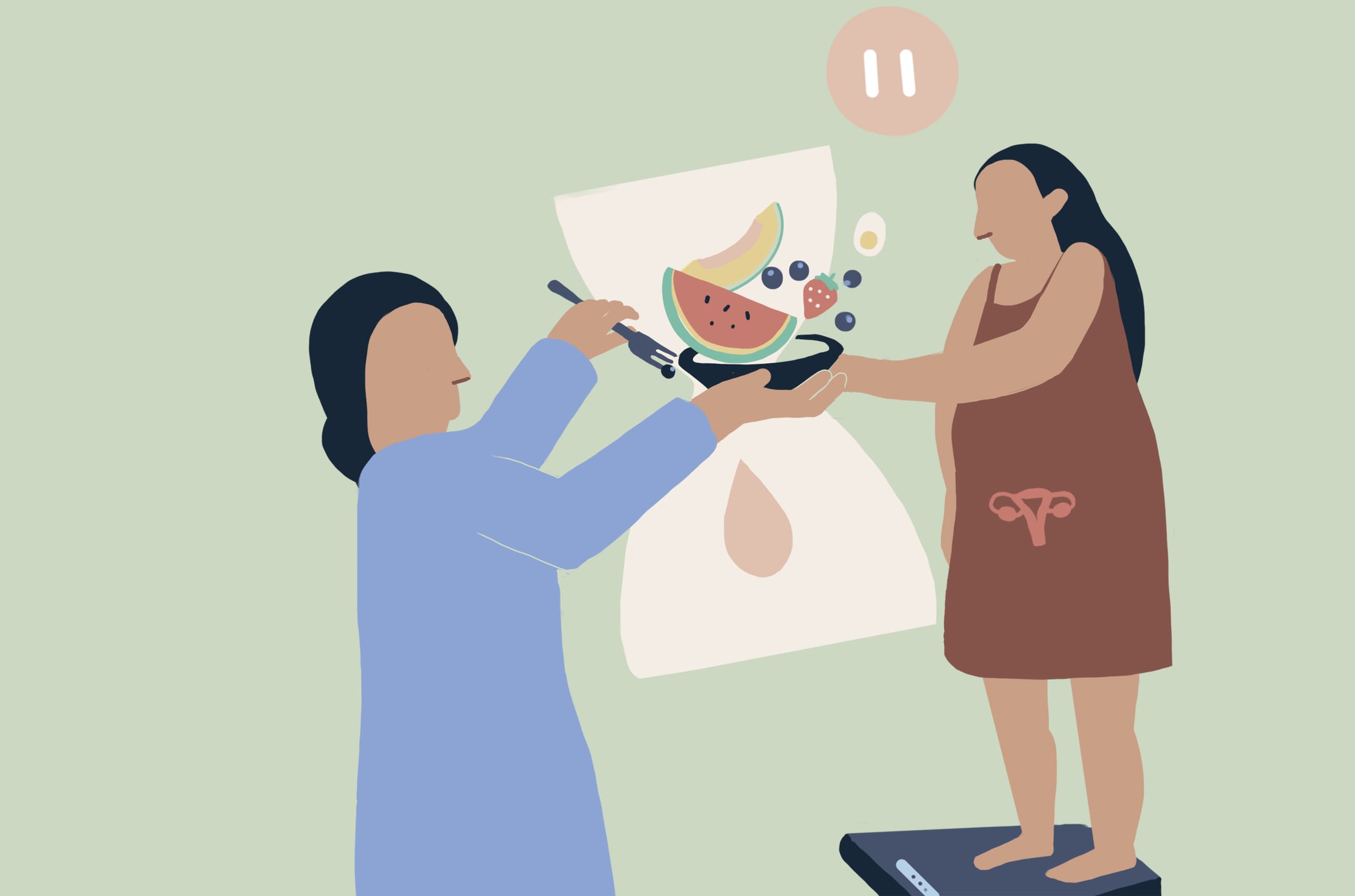This article has been compiled by Vaibhavi Kodnani, a content writer at Proactive For Her.
During perimenopause, menopause and postmenopause, a woman starts experiencing various physical and mental changes. Sudden weight gain is a common factor affecting menopausal women. The increasing weight and other bodily changes may take a toll on a woman’s mental health. As a last resort towards losing weight, she may opt for harmful ways such as crash dieting or develop eating disorders. But, there are many healthy ways of preventing weight gain.
Before moving onto that, let’s understand the reasons behind a woman’s weight gain during menopause.
- Declining estrogen levels
- Neglecting self-care
- Slowed down metabolism with ageing
- Lack of physical activity
- Increasing stress levels due to physical and emotional changes
- Lack of adequate sleep
- Insulin resistance
- Lifestyle disorders like diabetes, metabolic syndrome, hypertension
16 healthy ways to prevent weight gain during menopause
Weight gain and bloating affect a woman’s body image. There is a risk of getting anxiety and depression in severe cases. Therefore, managing weight is crucial for menopausal women.
Start taking care of yourself at an early age
Ideally, everyone should start giving importance to their health from an early age. For women, the bones reach their maximum strength and density by 30 years of age. If they take care of their body during their 20’s and 30’s, they will have optimal bone density, lean body mass and good muscle percentage. It will eventually help them during menopause; they will neither face significant weight loss or weight gain nor will the other menopause symptoms be severe.
A simple 4 step formula to stay healthy:
- Eat a healthy and nutritious diet
- Exercise regularly
- Sleep well
- Manage stress
Increase protein intake
Protein improves satiety and will prevent you from overeating. Include protein in all your meals to maintain muscle mass and weight gain.
Sources: organic free-range eggs, organic chicken, organic fish, red meat, lentils
Increase antioxidants
Antioxidants help to reverse the signs of ageing. They improve your skin health and reduce the risk of heart diseases, thus helping with your menopause symptoms.
Sources: all fresh fruits and vegetables; all kinds of fresh berries like strawberries, blackberries, etc.
Include fibre in your meals
Eating all fresh fruits and vegetables will fulfil your micronutrient requirements of vitamins and minerals. They are also a good source of fibre which is essential for a healthy digestive system. The gut and the brain are interconnected. An unhealthy gut can eventually lead to anxiety or depression. Hence, gut health is crucial for the body.
Sources: all fresh fruits and vegetables
Consume probiotics and prebiotics
Probiotic and prebiotic foods are also necessary to keep the gut healthy. Prebiotics are compounds in foods that help good bacteria to grow in your gut. It helps maintain your digestive system and improves metabolism. Probiotic foods already contain the good bacteria that are necessary for a healthy body.
Sources of prebiotics: whole grains, fresh fruits and vegetables
Sources of probiotics: curd, buttermilk, sauerkraut, kimchi, homemade pickles, kombucha or probiotic culture (small tube or tablets)
Avoid foods high in sodium
If you feel bloated during menopause, it is possibly due to your fluctuating hormones. To avoid bloating, you should monitor your salt intake as sodium retains more water in the body. Hence avoid all packaged and processed foods because they contain high amounts of sodium. It will help you feel much lighter.
Eat potassium-rich foods
Potassium helps flush out the excess water from the body, so women must eat potassium-rich foods to reduce their bloating.
Sources: watermelons, cantaloupe, muskmelon, bananas, green leafy vegetables
Drink more water
Our body predominantly consists of water. Increasing your water consumption will also help to reduce the bloated feeling.
Tip: Water intake depends on your physical activity as well as geographical location. However, drink approximately 1 litre for every 20 kgs of your body weight.
Reduce refined sugars and refined grains
Refined grains and sugars spike up the insulin levels, causing your blood sugar levels to drop rapidly and creating more cravings. The fluctuating insulin levels increase the body fat percentage in the body. Hence, it becomes crucial to maintain blood sugar levels in the body to avoid sudden insulin spikes. It will help you maintain your weight.
Furthermore, refined grains and sugar are devoid of their nutrients and fibre. Whole grains, jaggery and likewise become a wiser choice. They not only provide nutrition but also help you feel fuller for a longer time. This way, you will not give in to cravings.
Refined flour alternatives: whole wheat, unpolished rice, millets, rolled oats.
Sugar alternatives: coconut sugar, organic jaggery, stevia, apple sauce, date syrup, fruits, dark chocolate, dates
Eat healthy fats
Our hormones are composed of both protein and fat. The body also needs healthy fats for our heart and brain health.
Sources: nuts like almonds, walnuts, hazelnuts; oilseeds, pumpkin seeds, flaxseeds, sunflower seeds, avocados, unrefined oils for cooking (cold-pressed or wood pressed oils)
Consume foods having magnesium
Magnesium reduces anxiety and improves sleep quality. Hot flashes, night sweats, mood swings, anxiety, depression are all side effects of menopause that affect sleep quality. As a result, it is difficult to fall asleep or get uninterrupted night sleep. Adding magnesium-rich foods to the diet can help improve sleep quality.
Sources: dark chocolate, lavender tea, chamomile tea, pumpkin seeds, walnuts
Get enough sleep
An adequate amount of uninterrupted night sleep can also help you maintain your weight. When you don’t sleep enough, you will be fatigued the entire day. It will increase your sugar cravings to gain the energy needed for working. There will be an insulin spike which will lead to more cravings. In this manner, you will never be able to manage your weight.
Tip: 6-7 hours of uninterrupted night sleep is beneficial.
Manage your stress
Stress links to gaining weight as well as acquiring lifestyle diseases like hypertension or diabetes. It can increase fat around the abdominal area. Hence, women must practise stress management techniques such as meditation, music therapy, yoga, practising hobbies.
Do physical activity daily
Even though exercise cannot improve the bone density or muscle mass in menopausal women, still it can help them maintain it to prevent complications. Exercising also releases endorphins, the feel-good hormone, which improves the mood. Working out also helps to reduce bloating.
Tip: Exercise at least 5 times a week for 40 minutes
Practice mindful eating
If you eat your food mindfully, you will not end up overeating. Even if you are craving sweets, eat them with complete awareness. It will prevent unwanted weight gain.
Eat calcium-rich foods and get enough Vitamin D
Menopausal women should consume enough calcium needed for bone health. For optimal absorption of calcium, the body needs Vitamin D. Low levels of Vitamin D have also linked with gaining fat over your abdominal area.
Sources of calcium: local Indian cattle milk, dark green leafy veggies, soy, tofu, soy milk, ragi, sesame seeds, chickpeas
Sources of Vitamin D3: exposure to sunlight, supplements, egg yolks, mushrooms
Bottom line
Menopause is an inevitable part of every woman’s life. Being aware of the symptoms is the first step to acceptance. Losing weight might be difficult because of the fluctuating hormones. But using health and nutrition tips, you can at least manage and prevent weight gain. Always remember that it is not in your control; it is okay to feel low sometimes. Support from friends and family can help you deal with it better.
Disclaimer - This information is provided for educational purposes and should not be construed as medical advice. Please consult with your healthcare practitioners before undertaking any changes in your diet or adding supplements.
Proactive is a digital clinic for women, offering accessible, personalized, and confidential healthcare solutions. We offer products and services for out-patient health concerns of Indian women, across their lifetime - from puberty to pregnancy to menopause. To know more on the sexual and reproductive health of women, visit https://www.proactiveforher.com/

